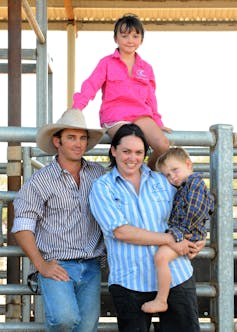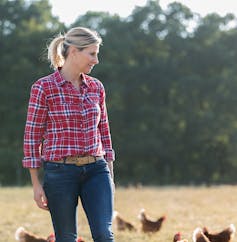the old ones no longer fit once you move to the country
- Written by Rachael Wallis, Lecturer and Research Fellow, University of Southern Queensland
What happens if you decide to jump in, Escape to the Country-style, and flee the city rat race?
Well, for a start, your identity begins to change in response to the new place around you. This change happens inside you, but is also reflected in the objects you surround and clothe yourself with.
Read more: How moving house changes you
My recent research looked at the stories of two women who moved from the city to the country and published books about their experiences. Hilary Burden moved from London to rural Tasmania and wrote about it in A Story of Seven Summers. Margaret Roach, author of And I Shall Have Some Peace There, moved from New York City to rural upstate New York. The two women tell the story of their moves, but at the same time, they narrate a journey of changing identity that is shared with others through the clothes they wear.
In memoirs such as these, the authors interpret the events they write about, but so does the reader, who brings their own understandings to their imagined experience. This allows readers to imagine a new way of living too, through the pages of the book. Through this, they might imagine their own SeaChange.
Clothes are part of our identity
When people get dressed each day, they let others know who they are, or who they think they are, in an identity-sharing performance. The clothes the authors discuss in the pages of their memoirs effectively map how their identity changed and how they shared this change with the people around them by wearing different styles of clothes from the ones they wore before. These items combine to produce a narrative that lets others understand those around them more clearly.
 This Northern Territory family’s clothing is part of who they are.
Dave Hunt/AAP
This Northern Territory family’s clothing is part of who they are.
Dave Hunt/AAP
Most of the time people are not even aware that they are doing this. They just pick and choose the things they like from the vast array of options open to them.
Sometimes, however, it becomes clear that the clothes that once worked for a person just do not “fit” any more. This can happen in the process of life transformation, including moving from the city to the country the way these women did.
Roach had experienced a long and successful career at Martha Stewart Omnimedia. She knew how to dress for her professional role and had confidence in sharing her wealth and status through the expensive suits she bought. When she moved to the country, however, she could not dress in the same way. With her career behind her, she asked herself: “Who am I if I am not mroach@marthastewart dot com any longer?”
Unsure, and in pyjamas
This lack of clarity about her evolving identity is shown in the pyjamas she starts to wear during the day. Far from familiar terrain, and experiencing a state of flux and transition, Roach finds it simpler just to remain in her nightclothes and not have to figure out her new identity via the clothes she wears. Understanding this dilemma, Roach describes how her old way of living no longer fits her new self:
…like the wardrobe hanging in my closet, a vestige of a life left behind, it just doesn’t resemble me any longer.
She talks about how her clothes no longer fit, mentally or visually, with her new life in the country. With real insight, she writes:
The outside packaging … has to match what’s going on inside of me.
This understanding enables her to finally reconcile who she is to where she now lives. Once she negotiates this process, she is able to manage the transition of her clothing and visual identity to what works in her new country home.
Burden’s move across oceans starts a similar journey. She writes:
I knew I wanted to shed the stuff I associated with cities: suits … dressing up, being very important or busy or loud.
 Country clothing is both more practical and an expression of identity.
bernatets photo/Shutterstock
Country clothing is both more practical and an expression of identity.
bernatets photo/Shutterstock
These had once enabled her to present and perform her class identity and status to others, but they no longer suited her work outside at a farmers’ market in rural Tasmania. Her clothes needed to fit the time and place she lived in, but she found they did not. These old clothes end up in garbage bags on a journey to the op shop, and Burden adapts to share her new identity through her clothes.
These memoirs offer a glimpse into lives and identities within the imaginative space they create, permitting identity to be shared through language and text. They show how moving to the country impacts identity, and how these people need to work through this process of change to adapt to their new life and feel comfortable in their new location.
Next time you contemplate moving to the country, just be sure to factor in the cost of a whole new wardrobe!
Authors: Rachael Wallis, Lecturer and Research Fellow, University of Southern Queensland





